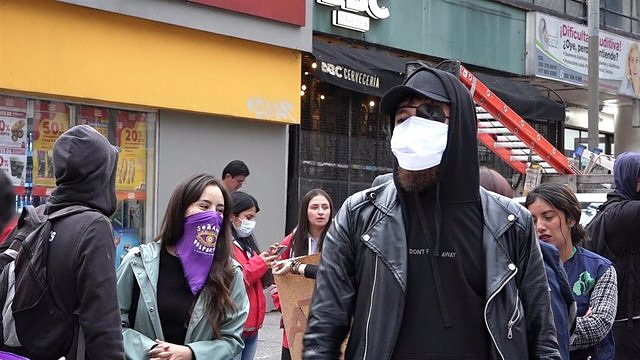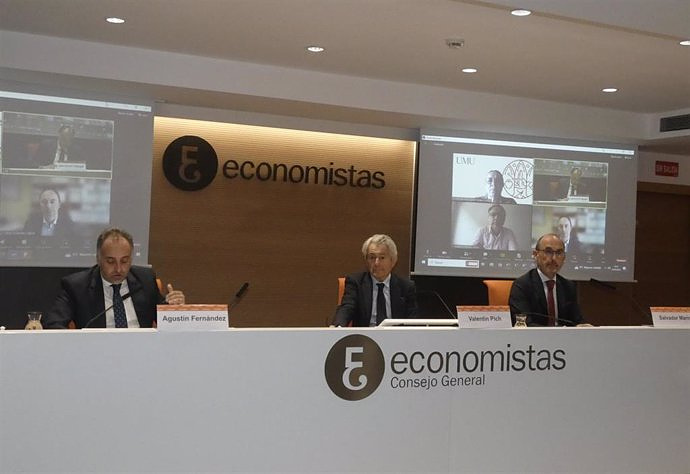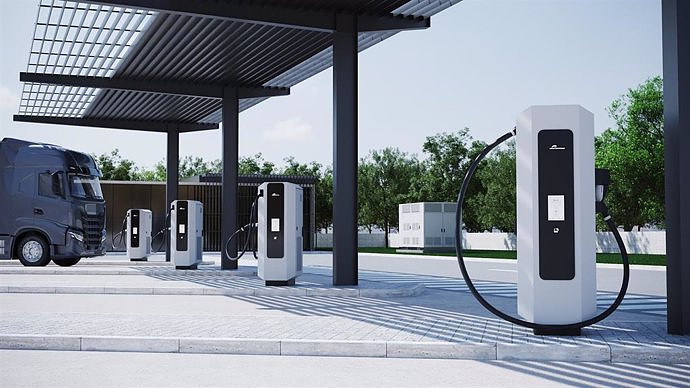The mobilizations of 2019 and 2021 defeated the Colombian 'establishment' and laid the foundations for the budding political turn
BOGOTÁ, June 12. (EUROPA PRESS) -
The current Colombian electoral process is deeply influenced by the great anti-government protests of 2019 and 2021, which left dozens dead, generated social transformations and also a greater interest in politics from sectors hitherto located on the margins of public life.
"We young people play a very important role. Many of us are fed up with the system. Everything has failed," says Gareth Sella, a 26-year-old who lost his sight in one eye last year, due to the effect of a rubber ball fired by the Mobile Anti-riot Squad (Esmad) of the Colombian National Police, during a march called to protest against police violence. At least 105 people had one of his eyes amputated due to projectile effects in 2021.
"That day they killed me, somehow," recalls the student. "What I had been for 24 years had ended, and another totally different life was beginning, one of struggle, more radical, more combative," he adds, while recently walking in another demonstration against the actions of the authorities.
At least 63 people died during the social outbreak of 2021, according to the United Nations, 28 of them at the hands of the Police, although the NGO Indepaz increases the total death toll to 83. Three people died during the 2019 protests.
Those who took to the streets last year demonstrated, initially, against a tax reform proposed by the president, Iván Duque, but soon added other demands, such as the establishment of a basic income for the poorest, the end of the murders of social leaders, better education and concise measures to attack unemployment, inequality and poverty.
Duque withdrew the tax reform and the finance minister resigned -- although he was soon appointed a high-ranking official at the Central Bank -- but he was unable to stop the demonstrations.
His government has been severely affected by the protests. The 'establishment' that supports the right-wing leader, made up of the two traditional parties, the Liberal and the Conservative, as well as the Democratic Center of his political godfather, former president Álvaro Uribe (2002-2010), was clearly defeated in the first electoral return held on May 29.
Fico Gutiérrez, the candidate of the formations that have governed Colombia since the 19th century, was third and therefore out of the ballot on June 19, in which leftist Gustavo Petro, a former M-19 guerrilla and former mayor of Bogotá, and the populist Rodolfo Hernández, a millionaire builder considered the Colombian Donald Trump. They are two very different politicians but they do not belong to the families and acronyms that have historically held the reins of the coffee country.
The low popularity of Duque, who will leave the Government in August with less than 30 percent approval, has contributed decisively to this defeat of the 'establishment'.
"Colombian society must have changed. We saw people die live, on Instagram, on television and other networks," says the student Sella.
According to a survey by the National Consulting Center, 70 percent of young people between the ages of 18 and 25 were initially in favor of the protests. Another firm, Invamer, registered, before the first round, that 53 percent of the voters in that age range were going to vote for the progressive Petro, who goes to the ballot in a technical tie with Hernández, according to the latest polls. .
"The fundamental symbol of the change and resistance that has occurred in Colombia is the awakening of consciences," exposes, patch on the face, another protester who lost an eye during the 2019 protests due to the effect of a stun bomb.
"The country has always had a large percentage of the population that considers itself apolitical. With the social explosion and the transformations that have been seen, which have affected them directly or indirectly, they have led to a change of consciousness. Those people who eight or ten years ago They didn't vote for years, now they take to the streets, demanding guarantees and rights.
60 percent of Colombians want change, according to polls, and the candidates, who got 68 percent of the votes together (40 percent Petro and 28 percent Hernandez), are aware of this. Petro managed to bring together most of the protest vote of the protesters, but Hernández has also achieved great support by criticizing "politicking" and traditional formations.
Part of the builder's chances in the elections is to maintain his independent image, something that has been complicated after receiving the support --unclaimed-- of the 'establishment' candidate, Gutiérrez, and the most extreme right-wing sector of Uribismo .
Petro has also allied itself with traditional regional bosses --some supporters have been harshly criticized by the bases--, but it did so in the first round and the benefit or detriment of these alliances has already been amortized.
Young Colombians yearn for change, and ask for it in the streets, but they are not strongly represented in either the Petro or Hernandez ranks. There is a clear lack of youth access to Colombian politics, contrary to what happens in other countries, such as Chile, where the new government is made up of thirtysomethings and has many twentysomethings in the front line.
In Colombia, Petro is 62 years old and Hernández is 77. His closest advisers are also veterans, except, perhaps, the progressive candidate for vice president, Francia Márquez, who is 40 years old.
"Young people are economically affected by the general situation in the country. We lack the tools, free, public, quality education that can guarantee that we get the tools to generate solid political discourse," protester Sella lamented in a country where This Sunday, more people under 30 years of age have the right to vote than ever before.

 Exploring Cardano: Inner Workings and Advantages of this Cryptocurrency
Exploring Cardano: Inner Workings and Advantages of this Cryptocurrency Seville.- Economy.- Innova.- STSA inaugurates its new painting and sealing hangar in San Pablo, for 18 million
Seville.- Economy.- Innova.- STSA inaugurates its new painting and sealing hangar in San Pablo, for 18 million Innova.- More than 300 volunteers join the Andalucía Compromiso Digital network in one month to facilitate access to ICT
Innova.- More than 300 volunteers join the Andalucía Compromiso Digital network in one month to facilitate access to ICT Innova.-AMP.- Ayesa acquires 51% of Sadiel, which will create new technological engineering products and expand markets
Innova.-AMP.- Ayesa acquires 51% of Sadiel, which will create new technological engineering products and expand markets White House debunks Hamas's proposal for a five-year truce in exchange for a Palestinian state
White House debunks Hamas's proposal for a five-year truce in exchange for a Palestinian state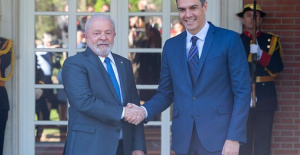 Lula speaks with Sánchez to show him his "solidarity" and highlight his "role and leadership"
Lula speaks with Sánchez to show him his "solidarity" and highlight his "role and leadership"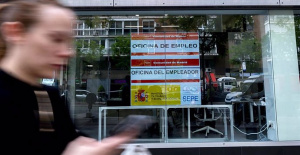 Unemployment rises by 117,000 people until March and 139,700 jobs are destroyed, its biggest drop since 2020
Unemployment rises by 117,000 people until March and 139,700 jobs are destroyed, its biggest drop since 2020 STATEMENT: Sottopiatto presents the most exclusive kitchenware to give as a gift on Mother's Day
STATEMENT: Sottopiatto presents the most exclusive kitchenware to give as a gift on Mother's Day How Blockchain in being used to shape the future
How Blockchain in being used to shape the future Not just BTC and ETH: Here Are Some More Interesting Coins Worth Focusing on
Not just BTC and ETH: Here Are Some More Interesting Coins Worth Focusing on Retrópolis brings the golden age of video games and computing to the UPV
Retrópolis brings the golden age of video games and computing to the UPV Looking for video games that value the neighborhoods of Valencia
Looking for video games that value the neighborhoods of Valencia UPV researchers improve the efficiency of air conditioning systems using a geothermal heat pump
UPV researchers improve the efficiency of air conditioning systems using a geothermal heat pump València is committed to citiverse and smart tourism to be "the reference technological hub of the Mediterranean"
València is committed to citiverse and smart tourism to be "the reference technological hub of the Mediterranean" A million people demonstrate in France against Macron's pension reform
A million people demonstrate in France against Macron's pension reform Russia launches several missiles against "critical infrastructure" in the city of Zaporizhia
Russia launches several missiles against "critical infrastructure" in the city of Zaporizhia A "procession" remembers the dead of the Calabria shipwreck as bodies continue to wash up on the shore
A "procession" remembers the dead of the Calabria shipwreck as bodies continue to wash up on the shore Prison sentences handed down for three prominent Hong Kong pro-democracy activists
Prison sentences handed down for three prominent Hong Kong pro-democracy activists ETH continues to leave trading platforms, Ethereum balance on exchanges lowest in 3 years
ETH continues to leave trading platforms, Ethereum balance on exchanges lowest in 3 years Investors invest $450 million in Consensys, Ethereum incubator now valued at $7 billion
Investors invest $450 million in Consensys, Ethereum incubator now valued at $7 billion Alchemy Integrates Ethereum L2 Product Starknet to Enhance Web3 Scalability at a Price 100x Lower Than L1 Fees
Alchemy Integrates Ethereum L2 Product Starknet to Enhance Web3 Scalability at a Price 100x Lower Than L1 Fees Mining Report: Bitcoin's Electricity Consumption Declines by 25% in Q1 2022
Mining Report: Bitcoin's Electricity Consumption Declines by 25% in Q1 2022 Oil-to-Bitcoin Mining Firm Crusoe Energy Systems Raised $505 Million
Oil-to-Bitcoin Mining Firm Crusoe Energy Systems Raised $505 Million Microbt reveals the latest Bitcoin mining rigs -- Machines produce up to 126 TH/s with custom 5nm chip design
Microbt reveals the latest Bitcoin mining rigs -- Machines produce up to 126 TH/s with custom 5nm chip design Bitcoin's Mining Difficulty Hits a Lifetime High, With More Than 90% of BTC Supply Issued
Bitcoin's Mining Difficulty Hits a Lifetime High, With More Than 90% of BTC Supply Issued The Biggest Movers are Near, EOS, and RUNE during Friday's Selloff
The Biggest Movers are Near, EOS, and RUNE during Friday's Selloff Global Markets Spooked by a Hawkish Fed and Covid, Stocks and Crypto Gain After Musk Buys Twitter
Global Markets Spooked by a Hawkish Fed and Covid, Stocks and Crypto Gain After Musk Buys Twitter Bitso to offset carbon emissions from the Trading Platform's ERC20, ETH, and BTC Transactions
Bitso to offset carbon emissions from the Trading Platform's ERC20, ETH, and BTC Transactions Draftkings Announces 2022 College Hoops NFT Selection for March Madness
Draftkings Announces 2022 College Hoops NFT Selection for March Madness